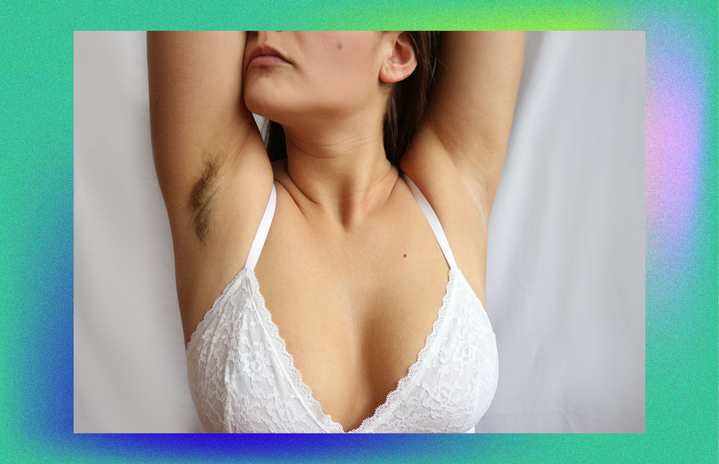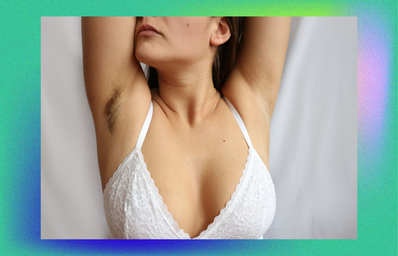Perhaps the strangest phenomenon of our time is our fixation on body hair — who has it, and how much, and where it’s growing. It’s a weird fixation, especially considering it’s so normal — humans have literally been growing hair on their bodies since the dawn of time. Celebrities like Julia Michaels and Amandla Stenberg are among an increasing number of stars who are unafraid to remind people that body hair and femininity are not mutually exclusive.
Still, body hair removal, at least for women, is very much the norm. According to a 2005 study of 678 women in the U.K., 90% of women surveyed reported removing hair from their armpits and legs. Many of these women shave or wax their pubic areas as well. If you’ve ever freaked out about forgetting to shave your legs before going to the beach, or you’re worried about what your hookup will think about your hair down there, then you probably fall into this percentage.
Personally, I became conscious of my body hair at a young age. I’ve shaved my armpits almost every day since I was 11 years old, and I don’t feel right when I don’t. I grew up feeling like shaving was a distinctly feminine trait — and that if I didn’t do it, I wasn’t “girly” enough. Even now, if I forget to shave one day, I feel off — as if I’m in the wrong skin. For many women like myself, it’s no surprise that body hair and confidence often go hand in hand.
I know I’m not the only one who thinks about this. So, I decided to survey eight women about their thoughts on body hair, sexualization, social norms, and why it shouldn’t matter what others think about our body hair decisions.
Body Hair & Confidence
Of the eight women I surveyed, all of them admitted to removing their body hair at least some of the time. Marissa*, 22, says she shaves everywhere besides her arms. “[I shave] mostly because it’s the social norm, but I also don’t like the feeling of being sweaty with body hair,” she says.
Jamie*, 19, says she began removing body hair after being told to. “I guess I was just told by family and friends and it stuck,” she says. “Although, after having removed my body hair for years, I now prefer when I’ve maintained my body hair — it makes me feel more confident and comfortable, and I prefer the way it feels.”
Sarah*, 22, says that removing her body hair makes her “feel more confident and comfortable” as a young woman, but when it comes to pubic hair, she just opts for a trim. “I never go bare because it seems too unnatural and uncomfortable,” she tells Her Campus. And Ruth*, 22, agrees — she says she feels better keeping some body hair rather than shaving it all. “I like to leave hair in certain areas,” she says. “I think it just looks better. If that’s gross, then call me gross.”
Body hair certainly isn’t gross, but Ruth is right about it being considered as such — at least when it’s on women. Anyone with a modicum of intelligence can see the double standard here: men are rarely considered unprofessional or unhygienic for having body hair, but when it comes to women, there are different expectations.
sex, societal norms, & the male gaze
If you think back to prehistoric times, men were the hunter-gatherers, the ones who went foraging for food and wrestled live bears for sport (I can smell the pheromones from here!) in an effort to make it back to the women alive. It makes sense, evolutionarily, that women would find body hair on men to be attractive; and according to research published in Women’s Studies International Forum, body hair was often viewed as a sign of a man’s strength, masculinity, and his ability to protect. Of course, this is a heteronormative and archaic way of looking at body hair, but goes to show that for men, body hair is a benefit — yet for many women, it’s viewed differently.
Cassidy*, 22, tells Her Campus, “I believe that there are conventional expectations that society has made for women. Women must be pure and flawless, which is why people think that it’s ‘feministy’ to not shave your legs.”
Tirzah, 22, agrees, and says that society is particularly “fixated on oppressing women” and condemning “unconventional” decisions like choosing to keep your body hair. She tells Her Campus, “Women who grow body hair are seen as ‘gross’ or as having ‘poor hygiene. Men and women have to fit into masculine and feminine standards, and anything out of the norm is [seen as] unacceptable.”
Sarah agrees that shaving completely is a societal expectation that primarily caters to the male gaze. “We are fixated on the idea that we have to be ‘bare’ for our intimate relationships,” says Sarah. “But in reality, it’s unnatural, and can be seen [by others] as childlike or ‘innocent.’” (Ew).
“People want to become more and more like seals everyday,” adds Ruth, and honestly, based on all of the flawless, smooth-skinned models on Instagram these days, I’m tempted to agree with her.
Claire, 21, calls out that society’s fixation on body hair has historical origins. “Our obsession with body hair came from sexist and racist beginnings, where shaving was a way for white women to differentiate themselves from nonwhite women, therefore presenting themselves as ‘cultured,’ or ‘civilized,’” she says. “From there, hair has spiraled further into racist, classist, ableist, and sexist beliefs that run through the veins of culture. But why should we, today, continue to hold onto these ideas, when we know their origins and complications?”
Despite the ongoing stigma about body hair, women like Claire stand by their decisions not to shave. “The decision to shave or not to shave has given me a greater sense of control over my body,” she tells Her Campus. “Every day we make choices on how we want to be perceived by the world. And over the years, I’ve cared less and less how people perceive me. My body is mine and my own. You only live once, so why not live in your body the way you actually want to?”
the double standard
It’s safe to say that much of the societal pressure for women to shave comes from other individuals and even from pornography, where there’s an ongoing standard that women must be hairless below their eyebrows in order to be physically and sexually attractive. Of course, this also caters to the male gaze. Men have said body hair on women is unattractive, “too masculine,” or even a sign that the woman neglects her personal hygiene. Men who say this, by the way, fail to consider that body hair on humans is an evolutionary tool designed to regulate our body temperature — not to mention the fact that we’re literally born with it. And to be honest, men’s unyielding desire for hairless women — supposedly because it can give off a feeling of innocence — definitely gives me the creeps.
For some, these expectations have affected their relationships. Cameron, 22, says she’s had a “few negative reactions” from SOs regarding her pubic hair. “[The reactions] actually did prompt me to remove more,” she tells Her Campus.
Cassidy had a similar experience: “One boyfriend encouraged me to shave my pubic hair because he thought sex would be more pleasurable.” (It’s unknown whether or not he meant more pleasurable for himself). It’s definitely worth mentioning that pubic hair helps to reduce friction during sex and protect against infection; but even so, it isn’t a partner’s place to decide what you do with your body. Body hair may not be quite as aesthetically pleasing to some men, but let’s be real, it’s not like it’s preventing orgasms or something. I’m also curious how often these men partake in manscaping themselves. Double standard, much?
When asked if an SO has ever reacted poorly to her body hair regimen, Marissa says, “I’ve never gotten any comments,” but calls out the fact that she has always removed her body hair, so partners may not have known the difference.
Claire says, “I’m blonde and don’t have a ton of hair on my body…for my pubic area, no one has ever made a comment to me. I attribute this to the partners I tend to pick, and the fact that many people in younger generations are more accepting of body hair.”
Jamie, meanwhile, says her boyfriend doesn’t care about her body hair or lack thereof, and Ruth says that if a partner ever told her to remove her body hair, she’d tell them to “gtfo.” Fair enough.
Still, other young women haven’t been so lucky. Tirzah tells Her Campus, “My ex would tell me girls who grow their body hair out are gross,” she says. “We are no longer together.”
Is Gen Z changing the narrative?
In a world plagued by climate change, wars, financial crises — not to mention the literal plague going on right now — how a woman chooses to groom herself should be the least of our worries. Yet, time and time again, women have been made to feel ashamed for forgoing a waxing trip or tossing their razors in the trash. Luckily, however, things seem to be changing in the 21st century. Whether it’s the result of fourth-wave feminism, celebs normalizing body hair, or the fact that women are sick of spending decades doing things to please men, some women, like those I surveyed, are attempting to change the narrative.
Cameron says she regularly shaves, but is far less strict about it than she used to be. “I enjoy the way I look with shaven legs, shaven armpits, and a lack of a unibrow — truly just a preference of personal appearance,” she says. “I used to feel extremely embarrassed when I began growing hair in places on my body other than my head, and super self-conscious in between shaves. But as I’ve grown older, I’ve been less bothered about public perception and only shave when I feel like it.”
Tirzah offers a similar sentiment. “I have embraced not being fixated on beauty standards every time I leave the house,” she says. “Usually when I decide to shave, it’s because I just randomly felt like it. It’s fun to think ‘hm, when’s the last time I shaved?’”
Claire, meanwhile, has gone years without shaving. “I haven’t shaved my legs in four years, and I haven’t shaved my armpits in about two years,” she says. “For my pubic area, I tend to trim it. I simply prefer my body that way. At the end of the day, I just don’t care that much about what people think of my body hair. I’ve never felt ‘weird’ or ‘different’ for my decisions. I intentionally surround myself with people who don’t care about small things like my hairy legs.”
So, what’s next?
People’s fixation on women’s body hair decisions can likely be attributed to a combination of societal expectations and an attempt to distinguish women from men. It’s almost as if women are meant to be squeaky-clean, clean-shaven counterparts to tough, full-bearded macho men who probably have never once taken a razor to their pubic areas in their entire lives. Okay, maybe that’s a bit of an exaggeration, but societal expectations and separating the feminine from the masculine are certainly factors at play here.
Although society’s relationship with body hair has gotten better in recent years, there is still plenty of stigma surrounding how women choose to groom themselves. Sadly, we do fixate on far more than just body hair — body shape, skin texture, facial features, and weight are just a few of the physical attributes women are disparaged for on a daily basis. Like it or not, our family, friends, or SOs will often have something to say about our bodies — hairless or otherwise — and we must remind them again and again that our cleanliness, femininity, and worth are not defined by our appearances. Whether you choose to remove all of your body hair, none of it, or you fall somewhere in the middle, your true value lies in your character, not in your likeness to a Barbie doll.
Sources:
Cameron, 22
Tirzah, 22
Claire, 21
Jamie*, 19
Sarah*, 22
Ruth*, 22
Cassidy*, 22
Marissa*, 22
*Names have been changed.
Studies:
Attwood, F. (2005). What do people do with porn? Qualitative research into the comsumption, use, and experience of pornography and other sexually explicit media. Sexuality and culture, 9(2), 65-86.
Basow, S. A., & Braman, A. C. (1998). Women and body hair: Social perceptions and attitudes. Psychology of Women Quarterly, 22(4), 637-645.
Toerien, M., & Wilkinson, S. (2003, July). Gender and body hair: Constructing the feminine woman. In Women’s Studies International Forum (Vol. 26, No. 4, pp. 333-344). Pergamon.
Toerien, M., Wilkinson, S., & Choi, P. Y. (2005). Body hair removal: The ‘mundane’production of normative femininity. Sex Roles, 52(5-6), 399-406.


